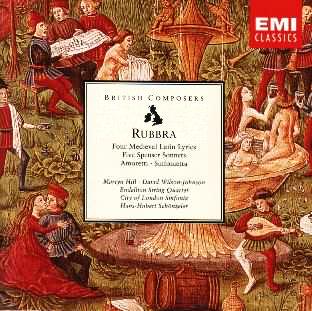 |

This disc has been a revelation to me and I regret missing it on its Virgin
issue ten years ago; it has now been re-issued in the EMI British Composers
series at mid-price. Edmund Rubbra has a following who regard him as
the greatest English symphonist; others might place him as one
of the greatest , but I am probably inviting an avalanche of e-mail when
I say that I have always struggled with his music. I will attempt to fend
off that e-mail by declaring that I really have been persistent and have
bought a number of CDs over the years, including this one which did not arrive
as a review copy, and have listened to most of the 11 symphonies. My problem
with Rubbra’s music is that although he has interesting ideas, I find
he does not develop them in a way that sustains my interest. He seems to
lose direction, seemingly meandering without purpose, quite unlike Arnold
and Alwyn who were contemporaries, all three having been born in Northampton
I purchased this disc in the hope that I might find Rubbra more persuasive
as a composer of pieces on a smaller scale and that is exactly what we have
here.
The disc contains three groups of songs and is completed with the Sinfonietta
for large string orchestra. This was a late work (Opus 163 composed in 1986
– the year of his death) but was his first piece for a string orchestra.
Hans-Hubert Schönzeler, the conductor on this disc, states that Rubbra
told him he wanted to compete in the tradition set by Elgar (Inroduction
and Allegro & Serenade), Vaughan Williams (Tallis variations etc.), Holst
(St Paul’s suite) and Britten (Frank Bridge variations, simple symphony
etc.). The Sinfonietta was first performed by the Albany Symphony Orchestra
who had wished to commission a work and accepted this one in progress. The
two sections, Andante con moto ma non flessibile and Lento run
contiguously through a held bass line. As with the Vaughan Williams Tallis
variations, this work sounds as if the composer had in mind a cathedral acoustic
rather than the concert hall, and indeed, the slow sonorous opening is
reminiscent of the opening of Dives and Lazarus (without the harp). This
music is powerful yet reflective – even sorrowful. A most valuable fill-up
lasting 15 minutes.
Two of the song cyles are settings for tenor of sonnets by the 16th Century
English poet Edmund Spencer. The Five Spencer Sonnets Opus 42 (1935)
were first performed by a soprano and string quartet but was reworked for
tenor and string orchestra. The second cycle, Amoretti Opus 43 (1936)
was written for tenor and string quartet but Schönzeler received verbal
authority to arrange the work for string orchestra as heard on this disc.
Being Sonnets they are full of sighing, sorrows and pining for lost love
but the settings are beautiful and enthralling with Martyn Hill (tenor) slightly
forwardly balanced against the string orchestra. Some of the perkier movements
(the second of the five Spenser sonnets for example) do sound like Britten
and Martyn Hill then reminds me of Peter Pears’ way with English song.
Many of these songs will have me coming back repeatedly because of their
beauty. If you have the opportunity to audition this disc listen to Shall
I then silent be or shall I speak? or the wistfullness of Lacking
my love I go from place to place.
The Four Medieval Latin Lyrics for Baritone (David Wilson-Johnson)
are more traditional, reflecting English folk-song which I do not detect
in the Spenser cycles. The opening song is rumbustuous. Summer is coming
and with it the love of a young maiden. The second is more plaintive as Summer
is slowly passing away and the love was unrequited. The third has maidens
dancing in the Spingtime and is reminiscent of some of the songs in Orff’s
Carmina Burana. The fourth and final song in this cycle is a powerfully affecting
lament Could I share thy grave with thee? Happy then my death would be.
Wholeheartedly recommended.
Reviewer
Len Mullenger

|
Reviewer
Len Mullenger
 |

